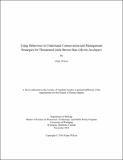| dc.contributor.author | Wilcox, Alana | |
| dc.date.accessioned | 2016-06-24T16:48:44Z | |
| dc.date.available | 2016-06-24T16:48:44Z | |
| dc.date.issued | 2014-11 | |
| dc.identifier.citation | Wilcox, Alana. Using Behaviour to Understand Conservation and Management Strategies for Threatened Little Brown Bats (Myotis lucifugus); A thesis submitted to the Faculty of Graduate Studies in partial fulfillment of the requirements for the Master of Science degree, Department of Biology, Master of Science in Bioscience, Technology, and Public Policy Program, University of Winnipeg. Winnipeg, November 2014. | |
| dc.identifier.uri | http://hdl.handle.net/10680/1207 | |
| dc.description | A thesis submitted to the Faculty of Graduate Studies in partial fulfillment of the requirements for the Master of Science degree, Department of Biology. Master of Science in Bioscience, Technology, and Public Policy Program, University of Winnipeg. | en_US |
| dc.description.abstract | Captive assurance populations can help preserve populations in the face of rapid declines that cannot be mitigated in the wild. Individual behavioural tendencies or personality may affect how easily different individuals acclimate to captivity and ultimately influence the success of captive assurance efforts. Temperate bat species face a range of conservation threats including habitat loss and degradation, mortality from wind energy facilities, and white-nose syndrome (WNS), a fungal disease causing the most rapid declines of mammals ever observed. I tested the hypothesis that behavioural tendencies associated with animal personality and the shy-bold continuum affect feeding behaviour in healthy and WNS-affected captive little brown bats (Myotis lucifugus), one of the species most affected by WNS. I predicted that, in comparison to shy individuals, bold, active bats would spend more time feeding, feed more frequently, arrive earlier to the food dish each night, and gain more mass in captivity than shy individuals. Bats were captured from the wild in spring and held in the laboratory in one of two flight cages, isolating healthy and WNS-affected individuals. I quantified behavioural tendencies using a hole-board test and recorded feeding behaviour. Every two days during the feeding experiment, I recorded body mass to quantify pre-hibernation mass accumulation. I found that more active WNS-affected bats fed more frequently and that grooming in the hole-board test (which may reflect anxiety) was correlated with body mass at capture (i.e., at the end of the preceding hibernation season). I also found that individuals from both healthy and WNS-affected groups arrived at the feeding dish in approximately the same order each night, which could reflect a dominance hierarchy. However, I found no evidence that order of arrival at the food dish affected feeding or mass accumulation. My results suggest that behavioural tendencies during the active season may impact captive maintenance of bats for conservation, particularly those affected by disease. More work is required to understand the role of dominance interactions on the potential success of captive assurance populations. | en_US |
| dc.description.sponsorship | This research was supported by the Natural Sciences and Engineering Research Council Canada Graduate Scholarship and a University of Winnipeg Graduate Studies Scholarship. Grants were also provided to CKRW from the U.S. Fish and Wildlife Service, Canada Foundation for Innovation, and Bat Conservation International. | en_US |
| dc.language.iso | en | en_US |
| dc.publisher | University of Winnipeg | |
| dc.rights | info:eu-repo/semantics/openAccess | |
| dc.subject | consistent individual differences | en_US |
| dc.subject | habitat enhancement | en_US |
| dc.subject | habitat modification | en_US |
| dc.subject | white-nose syndrome | en_US |
| dc.subject | Pseudogymnoascus destructans | en_US |
| dc.title | Using Behaviour to Understand Conservation and Management Strategies for Threatened Little Brown Bats (Myotis lucifugus) | en_US |
| dc.type | Thesis | en_US |
| dc.description.degree | Master of Science in Bioscience, Technology, and Public Policy | |
| dc.publisher.grantor | University of Winnipeg | |
| thesis.degree.discipline | Bioscience, Technology, and Public Policy | |
| thesis.degree.level | masters | |
| thesis.degree.name | Master of Science in Bioscience, Technology, and Public Policy | |
| thesis.degree.grantor | University of Winnipeg | |

